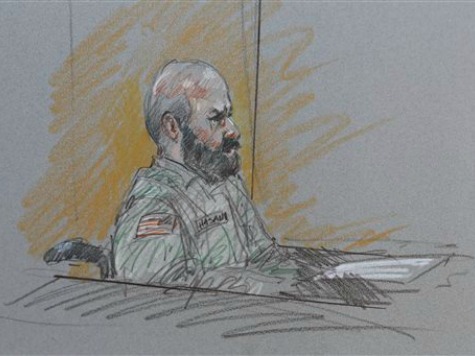
More evidence is piling up against the FBI when it comes to Nidal Hasan, the Army Major convicted for the mass killing of over a dozen people in the 2009 Fort Hood shooting.
First, the New York Times published two emails Hasan provided them, and now Mother Jones is reporting the FBI released emails and other documents that prove they could have prevented the November 5, 2009 attack.
A military panel found Hasan guilty of 13 premeditated murders and 31 premeditated attempted murders. The jury will begin to deliberate the sentence on Wednesday. The verdict was unanimous, which means the death penalty is on the table.
The prosecution wanted to use the emails and documents as evidence of Hasan’s motive, but Judge Col. Tara Osborn threw them out. They include a string of emails between Hasan and Anwar al-Awlaki, in which Hasan said he murdered his fellow soldiers because he wanted to protect al-Qaeda and Taliban soldiers. The FBI intercepted these emails almost a year before the attack. Hasan even wanted to discuss them for his defense, but Osborn dismissed this.
FBI officials always claimed the documents proved little, but they would not allow the Senate’s Homeland Security and Governmental Affairs Committee to review them. Even without these documents, however, the committee established in their report “A Ticking Timebomb: Counterterrorism Lessons from the U.S. Government’s Failure to Prevent the Fort Hood Attack” that officials had enough evidence to stop Hasan.
It turns out Hasan was brought to the FBI’s attention in December 2008. From Mother Jones:
The FBI’s Joint Terrorism Task Force in San Diego, which was tracking Awlaki, intercepted Hasan’s December email, along with another sent in January. A search of the Pentagon’s personnel database turned up a man named Nidal Hasan who was on active military duty and was listed as a “Comm Officer” at Walter Reed Army Medical Center in Washington, DC.
Normally, when the FBI unearths this kind of raw intelligence, it issues an Intelligence Information Report (IIR), which is shared with law enforcement agencies and the Office of the Director of National Intelligence. (This system was designed to prevent the kind of information bottlenecks that allowed the 9/11 plot to go undetected.) But the San Diego agents misinterpreted the “Comm Officer” label in Hasan’s file to mean “communications officer” (in fact, it meant “commissioned officer”) and believed that a person in this role might have access to IIRs. To avoid tipping him off, they skipped the report and sent a detailed memo requesting an investigation directly to the Washington, DC, Joint Terrorism Task Force, a multiagency team overseen by the FBI that investigates terrorism cases in the capital. The message noted that Hasan’s “contact with [Awlaki] would be of concern if the writer is actually the individual identified above.”
The file languished for nearly two months before it was assigned to an agent for the Defense Criminal Investigative Services, who was on the task force. According to a 2011 report on the Fort Hood shootings by the Senate Homeland Security and Government Affairs Committee, DCIS–a law enforcement agency within the Pentagon, which normally deals with fraud and cybercrime among military personnel and contractors–was ill-equipped to tackle a counterterrorism investigation.
The FBI did not stop Hasan, and he continued to write al-Awlaki, emailing him more than a dozen times between January and May 2009. The San Diego office found these messages, but the FBI did not link these emails to the one sent in December. The DCIS agent in DC actually delayed his investigation for 90 days and did not start until May 27, 2009 when he went through all the databases to see if Hasan was targeted before. He found Hasan’s personal file was mostly positive, and one psychiatrist said Hasan’s Islamic beliefs could be beneficial to the military.
Based on the personal file and the psychiatrist’s notes, the DCIS agent concluded the contact between Hasan and al-Awalki was for academic research and not terrorism-related. He did not bother to interview Hasan. An FBI agent in San Diego also concluded there was no need to investigate or interview Hasan in June 2009.
Five months later, Hasan opened fire at Fort Hood.
The survivors and victims’ families filed suit against the government because they believe this attack could have been prevented. They testified on Monday and Tuesday, telling the panel how hard it has been for them to cope with losing their loved ones.

COMMENTS
Please let us know if you're having issues with commenting.